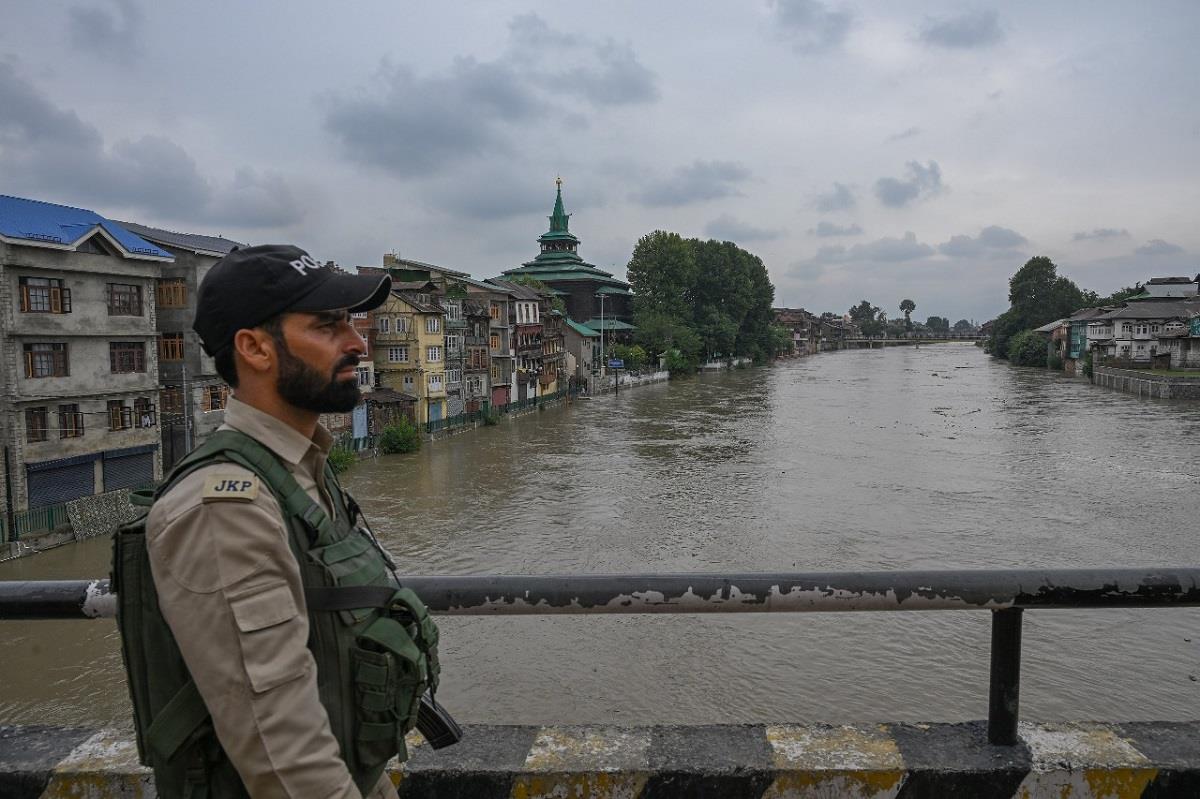
11 Years Of Inaction: Key Jhelum Flood Projects Yet To Take Off
KO photo by Abid Bhat
Srinagar- Despite repeated flood threats looming over the Kashmir Valley, two of the most crucial components of the ₹1,623 crore Comprehensive Flood Management Plan for River Jhelum remain stalled, caught in financial and technical deadlock.
The ambitious project, cleared by the Union Ministry of Water Resources, River Development and Ganga Rejuvenation in March 2022, was designed to strengthen Kashmir's flood resilience under Phase-II (Part A) of the Jhelum and tributaries management plan. It was recommended for inclusion under the Flood Management Project (FMP) component of the Flood Management Project & Border Areas Programme (FMPBAP) for 2021–26, with 90% central assistance and 10% Union Territory funding.
The J&K Administrative Council gave its formal nod to the project in July 2022. However, two high-value works-resectioning of the Flood Spill Channel (FSC) and widening of the Outfall Channel (OFC)-together estimated at ₹1,280 crore, have seen no progress.
Conflicting Studies, Mounting Costs
The delay stems from conflicting assessments by two agencies: Pune-based Central Water & Power Research Station (CWPRS) and multinational consultancy EPTISA. Both carried out hydrological studies but arrived at differing conclusions on the effectiveness of resectioning and widening interventions.
Given the divergence, the matter was referred to the Central Water Commission (CWC), which appointed its Member (River Management) as the nodal officer. After holding 11 rounds of meetings with stakeholders, the CWC submitted its recommendations to the J&K government on December 23, 2024.
Officials said the revised plan carries an additional financial implication of nearly ₹300 crore.“We need to secure approval for additional funding before work on these components can begin,” a senior official from the Irrigation and Flood Control Department said.
The official also cautioned that excavation up to two meters deep in the Flood Spill Channel could leave nearly 20 bridges vulnerable, exposing their foundations.“Strengthening them will require extra resources, further escalating the project cost,” he added.
When contacted, Minister for PHE, Irrigation and Flood Control, Javed Rana, confirmed that the project was under examination.
“Nothing substantial was done in the last 11 years to prevent floods in Kashmir. We are now carefully reviewing the project and its altered cost structure,” he said.
A Race Against Time
The Jhelum River, which devastated Srinagar and adjoining districts during the September 2014 floods, remains a looming threat. Experts warn that delays in strengthening flood management infrastructure could prove disastrous for lives and property in the Valley.
While smaller works under the project have progressed, the fate of its two most critical components-considered essential to enhancing Jhelum's discharge capacity-remains uncertain, pending financial clearance and technical consensus.
HC Summons J&K Officials Over Flood Threat
Meanwhile the High Court of Jammu and Kashmir and Ladakh on Monday took a serious note of concerns raised over flood preparedness in Kashmir and directed top bureaucrats to appear in person before the Bench.
The intervention came during the hearing of a Public Interest Litigation (PIL) filed by the Environmental Policy Group (EPG).
The Division Bench, headed by the Chief Justice, examined a six-page report submitted by EPG convenor Faiz Ahmed Bakshi through Amicus Curiae Advocate Nadeem Qadri.
The report highlighted the risks posed by inadequate preparedness, encroachment on wetlands, and the absence of long-term planning.
Following the submission, the Court directed the Commissioner Secretaries of the Irrigation and Flood Control Department and the Housing and Urban Development Department, along with the Divisional Commissioner Kashmir, to be present at a special hearing scheduled for September 9 (Tuesday).
The Bench also instructed the government to file a detailed Action Taken Report (ATR).
The EPG report called for a halt to all land allotments, sales, or transfers within 500 metres of wetlands, arguing that unchecked encroachment was reducing the Valley's natural flood absorption capacity.
It specifically mentioned projects such as Rakh Arth, Transworld University, and IIM Srinagar, urging that they be stopped immediately. The report further recommended that no government buildings or facilities be constructed without confirming the land is not a waterbody.
The report said that the carrying capacity of the Jhelum River and its flood channels has not been increased despite repeated court directions since 2014. Dredging operations undertaken in the years after the floods were described as incomplete and inconsistent.

Legal Disclaimer:
MENAFN provides the
information “as is” without warranty of any kind. We do not accept
any responsibility or liability for the accuracy, content, images,
videos, licenses, completeness, legality, or reliability of the information
contained in this article. If you have any complaints or copyright
issues related to this article, kindly contact the provider above.


















Comments
No comment